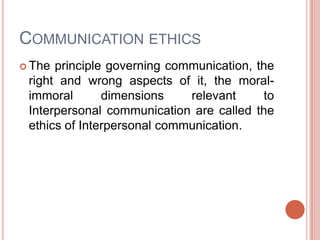Communication Ethics Definition
In the world of communication, there’s something called “communication ethics.” So, what does that even mean? Well, communication ethics refers to the principles and standards that guide our behavior in how we communicate with others. It’s all about how we treat people, respect their opinions, and consider the impact our words and actions have on them.
Think about it this way: Have you ever felt hurt or misunderstood because of something someone said? That’s where communication ethics come into play. It’s about being mindful of the words we choose, listening actively, and being empathetic towards others. In a nutshell, communication ethics is like a compass that helps us navigate through our interactions while being kind, considerate, and respectful.
Now, you might be wondering why communication ethics even matter. Well, imagine a world without any guidelines for how we communicate. It would be chaos, right? Communication ethics provide a framework for building healthy relationships, resolving conflicts peacefully, and fostering understanding among individuals and communities. So, understanding and practicing communication ethics is essential for creating a harmonious and respectful society.
In this article, we’ll dive deeper into the fascinating world of communication ethics, exploring its definition, key principles, and real-life examples. So, get ready to enhance your communication skills and become an ethical communicator who makes a positive impact on the world around you!
Communication ethics refers to the principles and standards that guide ethical communication practices. It involves making moral decisions about what is right and wrong in how we communicate with others. These decisions are based on values such as honesty, respect, fairness, and transparency. By adhering to communication ethics, we can foster trust, understanding, and meaningful connections in our interactions. Understanding and practicing communication ethics is crucial for maintaining positive and ethical communication in personal and professional relationships.

Understanding Communication Ethics: Definition and Importance
Communication ethics is a branch of ethics that focuses on the moral principles and guidelines that should govern communication in various contexts. It encompasses the ethical responsibilities, obligations, and considerations that individuals, organizations, and societies should uphold when engaging in communication activities. Communication ethics plays a crucial role in maintaining trust, fostering understanding, and promoting ethical behavior in interpersonal, professional, and public communication settings. In this article, we will explore the definition, importance, and key principles of communication ethics.
1. The Definition of Communication Ethics
Communication ethics can be defined as the study and application of moral principles and guidelines in the field of communication. It involves examining the ethical implications of different communication practices, such as truthfulness, respect, fairness, confidentiality, and accountability. Communication ethics also addresses the ethical challenges that arise in the digital age, including issues related to privacy, online harassment, misinformation, and cyberbullying. By guiding communication behaviors and promoting ethical standards, communication ethics seeks to promote responsible and respectful communication in various contexts.
Ethical communication is characterized by transparency, honesty, integrity, and empathy. It involves active listening, respecting diverse perspectives, and valuing the dignity and rights of others. Ethical communicators strive to uphold ethical principles, promote the common good, and avoid harm to others in their communication practices. Understanding communication ethics is essential for individuals, organizations, and societies to foster positive relationships, build trust, and promote ethical decision-making in their communication endeavors.
2. The Importance of Communication Ethics
Communication ethics is of paramount importance in fostering ethical behavior and creating a positive communication climate in various contexts. Here are three key reasons why communication ethics is important:
A. Building Trust and Credibility
Ethical communication forms the foundation of trust and credibility in interpersonal relationships, professional settings, and public discourse. When individuals and organizations communicate in an ethical and truthful manner, they build trust and reputation. Trust is essential for establishing strong relationships, effective teamwork, and successful negotiations. Ethical communicators are perceived as reliable, honest, and trustworthy, which enhances their credibility and influence.
B. Respecting Others and Valuing Diversity
Communication ethics promotes the values of respect, fairness, and openness. Ethical communication involves respecting the rights, opinions, and perspectives of others, even when they differ from your own. It encourages active listening, empathy, and valuing diversity, which are crucial for fostering inclusive and respectful communication environments. By prioritizing ethical principles in communication, individuals and organizations can create spaces where everyone feels valued, heard, and respected.
C. Promoting Ethical Decision-Making
Communication ethics provides a framework for evaluating the ethical implications of communication choices and actions. By considering ethical principles such as honesty, integrity, and accountability, individuals and organizations can make informed and responsible decisions in their communication practices. Ethical decision-making in communication involves weighing the potential impact of messages, considering the rights and well-being of others, and upholding ethical standards. It helps avoid misleading information, manipulation, and harm to individuals or society.
In conclusion, communication ethics is the moral compass that guides responsible and ethical communication in various contexts. It encompasses principles such as truthfulness, respect, fairness, and accountability. By upholding ethical standards in communication, individuals, organizations, and societies can build trust, foster understanding, and promote positive relationships. Understanding and practicing communication ethics is essential for promoting ethical decision-making and creating a communication climate that respects the rights and dignity of others.
Key Takeaways: Communication Ethics Definition
1. Communication ethics refers to the principles and standards that guide ethical behavior in all forms of communication.
2. It involves being honest, respectful, and considerate in both verbal and non-verbal communication.
3. Communication ethics promotes fairness, transparency, and accountability in communication exchanges.
4. It emphasizes the importance of listening actively and empathetically to others.
5. Adhering to communication ethics helps build trust, enhance relationships, and avoid misunderstandings or conflicts.
Frequently Asked Questions
Welcome to our frequently asked questions section on communication ethics definition. Here, we have answered some common queries to help you understand the concept better.
1. What is the definition of communication ethics?
Communication ethics refers to the principles and moral guidelines that govern the exchange of information and ideas between individuals or groups. It encompasses the ethical considerations and responsibilities involved in transmitting, receiving, and interpreting messages in various forms, such as verbal, nonverbal, written, or digital communication.
Communication ethics involves being honest, respectful, and fair in communication interactions, considering the impact of our words and actions on others, and striving for ethical behavior that promotes justice, empathy, and inclusivity. It also involves addressing issues such as privacy, confidentiality, freedom of expression, and the responsible use of technology.
2. Why are communication ethics important?
Communication ethics are crucial for maintaining healthy and effective relationships, both personal and professional. They provide a framework for ethical decision-making, ensuring that our interactions and messages align with moral principles and societal values.
By practicing communication ethics, individuals and organizations can build trust, foster understanding, and create an inclusive environment where different perspectives are valued. Additionally, communication ethics help prevent miscommunication, conflict, and the spreading of misinformation or harm through communication channels.
3. How do communication ethics apply to different forms of communication?
Communication ethics apply to all forms of communication, including face-to-face conversations, written letters, phone calls, emails, social media interactions, and any other medium used for exchanging information and ideas.
For example, in face-to-face communication, communication ethics involve active listening, being respectful, and using appropriate body language. In written communication, they encompass honesty, clarity, and avoiding plagiarism. In digital communication, communication ethics extend to responsible online behavior, online privacy, cyberbullying prevention, and distinguishing between reliable and unreliable sources.
4. How does cultural diversity impact communication ethics?
Cultural diversity plays a significant role in shaping communication ethics. Different cultures have varying norms, values, and expectations regarding communication practices, which can influence what is considered ethical behavior in a particular context.
Understanding and respecting cultural differences is essential in communication ethics. It involves being aware of cultural norms, avoiding assumptions or stereotypes, and adapting our communication style to promote understanding and inclusivity. Embracing cultural diversity enhances ethical communication by valuing diverse perspectives, minimizing misunderstandings, and promoting intercultural dialogue.
5. Can communication ethics evolve over time?
Yes, communication ethics can evolve over time as societies and communication technologies change. New communication channels, such as social media and digital platforms, present unique ethical challenges that were not as prevalent in the past. Ethical guidelines and norms are continuously reassessed and adapted to address emerging ethical dilemmas.
As our understanding of ethics and societal values progresses, communication ethics undergo refinement. They become more inclusive, reflecting evolving perspectives on issues such as privacy, diversity, social justice, and accountability. Regular examination and discussions on communication ethics help us navigate the ever-changing communication landscape responsibly.
Summary
Communication ethics is all about being honest, respectful, and fair when we talk to others. It’s important to think before we speak and consider how our words might affect someone else. We should also listen carefully to what others say and try to understand their point of view. By following these principles, we can create a more positive and understanding world.
Understanding communication ethics helps us build stronger relationships with others. It allows us to express ourselves in a way that is considerate and kind. Ultimately, communication ethics is about treating others the way we want to be treated – with honesty, respect, and fairness. So let’s remember to think before we speak and listen with an open mind, making the world a better place one conversation at a time.

